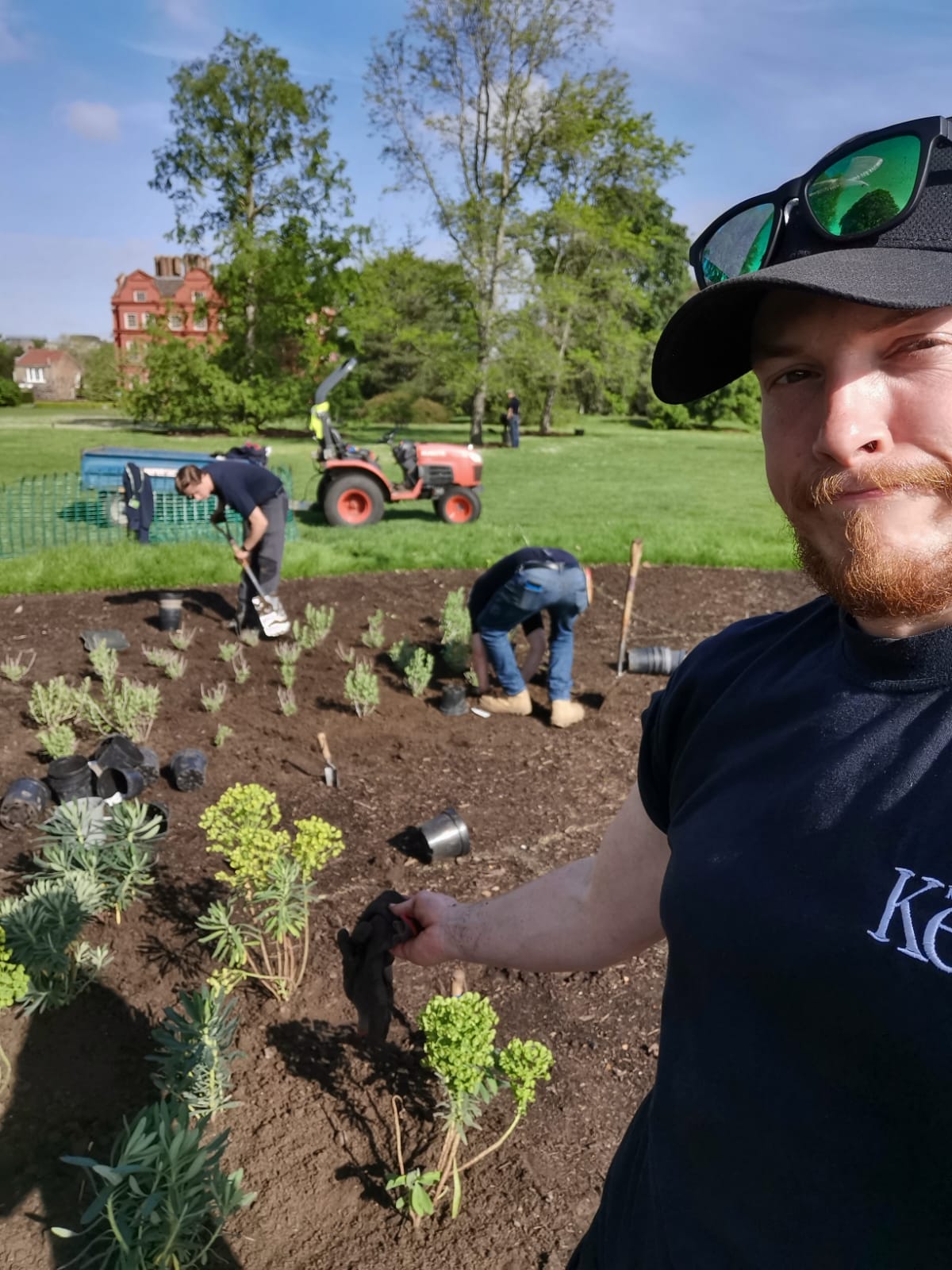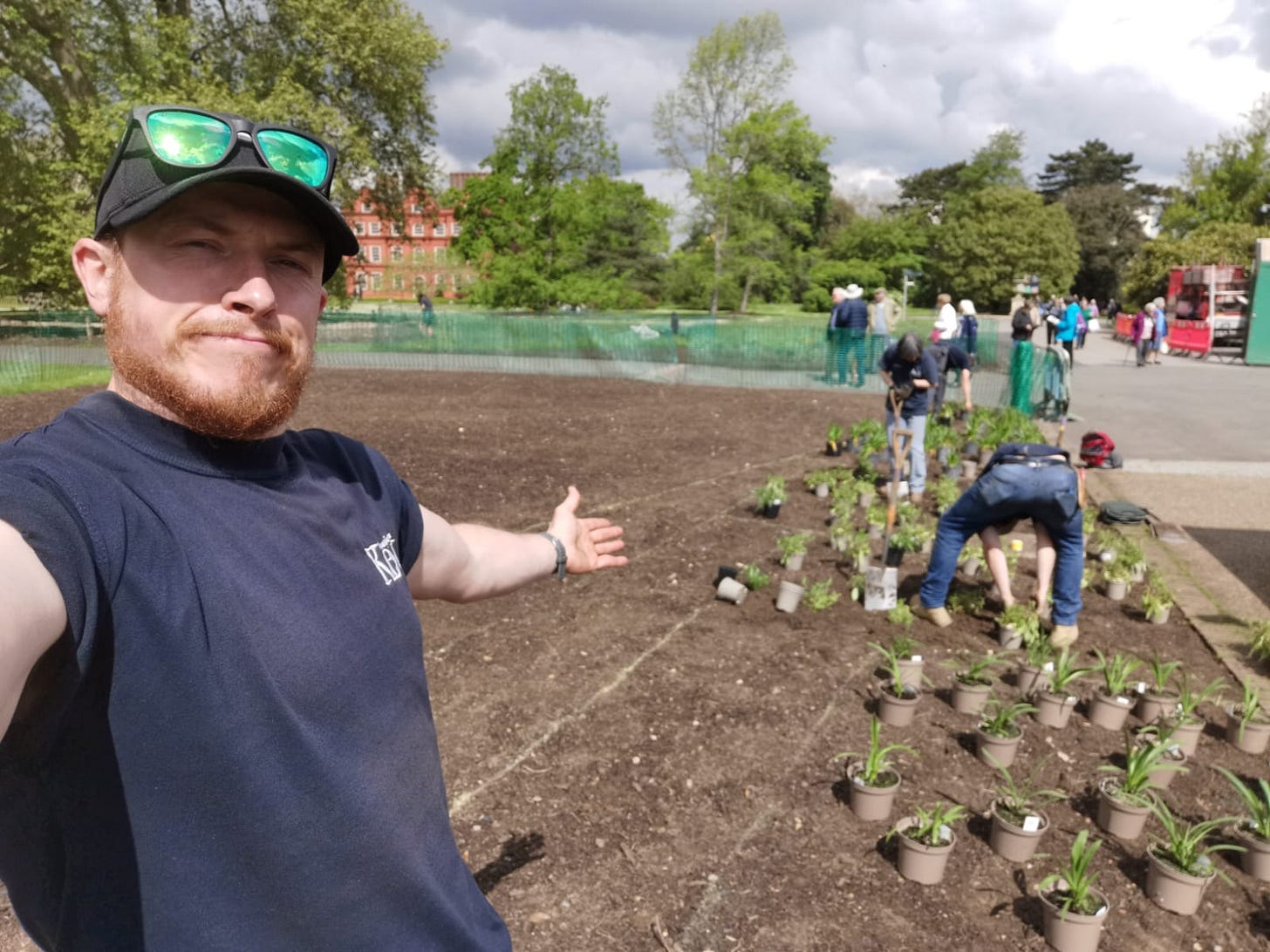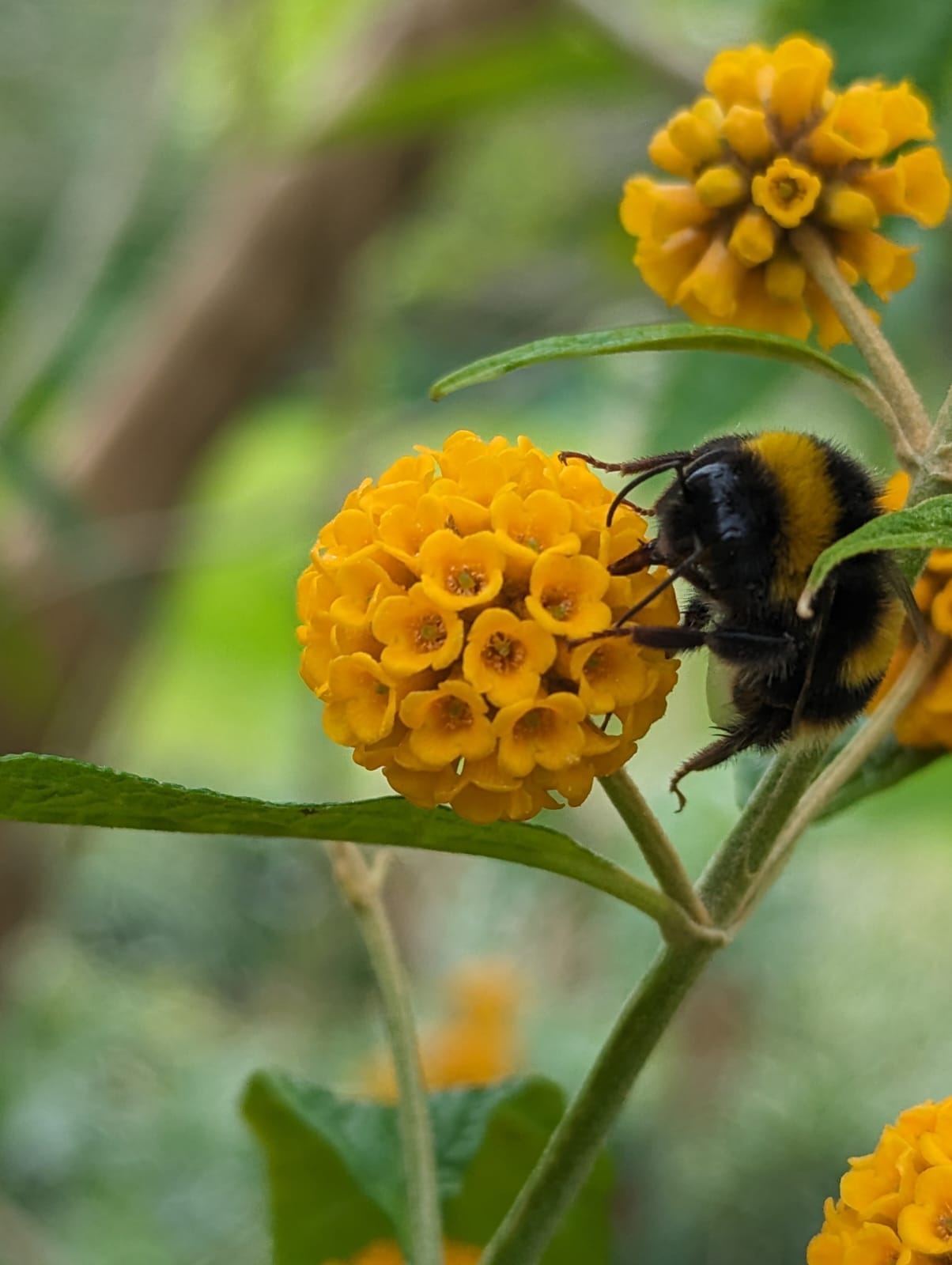hurdling with simon thompson: botanical horticulturist at kew gardens
on jobs that take you away from the desk, and the difference between giving up and choosing a different path
Hiya everyone. It’s been a hot minute since my last interview on here, but I’m so pleased to be back with this wonderful human, Simon Thompson.
Simon is a botanical horticulturalist at Kew Gardens, and one of my very favourite friends from our days at Swansea University.
When we all graduated, the majority of us in our friendship group took different variations of similar paths. We moved to London, where we either started internships, graduate schemes or dived straight into full-time jobs.
But not Simon. Instead of following everyone else’s route, he followed his gut. Knowing that a desk job was never going to be meant for him, he made decisions that reflected what really felt right for who he was. When everyone else was figuring our career paths and trajectories, Simon was figuring out how he really wanted to spend his days. He didn’t want to mould into what he thought he should be doing, but instead kept his mind open and his ideas creative, only making big decisions once he’d figured out what ‘what he wanted’ actually looked like.
Simon is one of the biggest inspirations in my life for truly trusting your gut, not following the crowd and knowing that what’s meant for you will not pass you by.
I hope you enjoy this interview as much as I did.
What does a snapshot of your life look like right now?
I currently work as a Botanical Horticulturalist at the Royal Botanic Gardens in Kew. I live in South West London with my dog Norman (who is immense) and my fiancée Alice (who is also immense, but definitely likes Norman more than she likes me). I love rugby, gaming and Married At First Sight Australia.
Right now, it’s March and I'm focused on winter work, which essentially gets us ready for the spring when things start growing again. This involves a bit of planning for the year ahead and getting over January and February – like all of us.
Can you give us an overview of your CV?
I’ve spent the last two years working as a horticulturalist at Kew Gardens, working on the Great Broad Walk Borders. I spend my days maintaining and adding to the planting, giving practical time for our students, training staff and students on our tractors, being a first aider and just about anything else you can think of.
Before that, I spent two and a half years at Capel Manor College, completing an apprenticeship in horticulture and landscaping. I also worked at the college, caring for the grounds and helping with practical lessons for the various classes taught there. I also worked for a company called Indoor Garden Design, putting planting installations throughout office buildings and hotels around London, plus big Christmas decorations in fancy places like the hotel by King’s Cross Station.
Before that, I spent a very brief period starting a teacher training degree. But while I loved the teaching, I just did not like everything else involved.
When I first moved to London, I spent a couple of years as a dog walker in Kensington. At the time, I had absolutely no idea what I was going to do next, but it definitely wasn’t a bad way to start life in the city. Also dogs are great, so that was obviously an enjoyable choice.
I also spent a summer working as a greenkeeper at a golf course, which is probably what subconsciously put the idea of horticulture in my brain.
And then before ALL of that, I worked at a load of different pub and bar jobs including Bamboo Bar in Swansea (the favourite of our friendship group) and The Anchor Inn near Lewes. I also did a brief stint at Hickstead Racecourse, putting up barriers for the horses to leap.
Q: When you were younger, what did you want to be when you ‘grew up’?
Oh, the usual. Superhero, army man, sports star, astronaut. Ok, I still want to be an astronaut. But honestly, I never had much of an idea of what I wanted – and that’s true even now. I'm still not set on how my career will go, but I do know that I never felt like any of the usual pathways into work matched what I thought I wanted to do. Over the years, I’ve just kept my ideas as open as I can until I figure out what ‘what I want’ looks like.
Q: Tell us about your first job. Where did you work, how did you get that job and what did you learn?
My first full time job was working at the Anchor Inn, a pub just outside of Lewes. It involved waiting tables and renting out little paddle boats for the river that ran alongside.
I remember I spent weeks and weeks driving around all the local pubs, handing out CVs that were half a page long with next to nothing on them – because like, what experience do you even have before your first job?! Eventually, I got lucky and I started working at The Anchor. It made me appreciate earning steady money for myself and having the ability to buy things with that money. That’s not exactly a great epiphany to share, but it was a start.
Q: Tell us about your worst ever job.
I genuinely don't think I’ve hated any of the jobs I’ve had. The shitty days have always happened but I’ve always been able to leave a job feeling like I’ve learned something from it. I think if you learned something about yourself or the world, it was probably worth doing. I struggled with teaching the most. I loved teaching itself, but the work outside the classroom was awful. I will never cease to be amazed at the people who can put all that extra work in and still somehow find the energy to teach, too.
Q: Tell us about how you became a Botanical Horticulturist at Kew Gardens?
I did my apprenticeship at Capel Manor College, which gave me the only main qualification I have in horticulture. It was 18 months long and it covered all the basic areas within the world of horticulture, which gave me a good base to start off with. Beyond that, I really knew that I wanted to end up at Kew Gardens to really be able to develop further, so I pushed on and on and tried to make sure I was as prepared as possible. Then, I pestered Kew about a job until they let me work there. In the time I’ve been working there, I’ve added a few more horticultural qualifications to my plate, which just adds to the level of work I can deliver and maybe towards future opportunities, too.
Q: What does a typical day of your job look like?
The alarm goes off at 5:55am (grim) and I drive in to get into our yard for 7:30. We have a morning meeting and discuss what the plans are for the day, then we head out. We get our tools out, do machinery checks, load up the tractor and go to work. This time of year on the Broad Walk, days involve cutting back the plants along our border – all 350m of it.
Most of the plants on the border are herbaceous perennials, meaning they're plants that live for several years at least and die back over winter before regrowing in spring. We can then mulch the beds (aka, adding a layer of material to the surface of soil) to give them some insulation in winter, more nutrients and some water retention in the summer.
At this time of year, my day will involve a lot of planning for the year ahead. I’ll be on the computer sorting plant replacements either to buy or propagate. We sort any projects we want to start for the year ahead and generally prepare for the growing season. We have a couple of breaks throughout the day for (much needed) cups of tea and lunch. Occasionally, I might give tours to certain groups along the Broad Walk. Or I might be training some students or new starters on how to drive our tractors. Most recently, we’ve been doing a lot of groundwork to prepare one section of our border to get new plants in, to rejuvenate the area with some new colours and themes.
Q: Did you always know you wanted to do a job that meant you didn’t have to sit behind a desk?
I think I always had a gut feeling that desk work wasn't going to be for me. All the mad ways I thought I could make a career were about as far away from an office as I could imagine. Things like wondering if I could make it as a professional rugby player or cricketer? Could I be an actor? Or could I set myself up to join the army? At one point or another as a got older, I eventually came to realise that these weren’t possible or realistic. And once I realised that my grades at university weren't going to get me into the Zoological side of ecology and conservation, I began to slowly settle on the idea of horticulture.
Physical health is definitely a big benefit to not having a desk job – apart from the fact that my knee is now basically made of wet paper. Working in a pretty physically intensive job has kept me fairly fit, robust and generally more healthy than I might have been working elsewhere. It’s the same as any job, where there are boring days or days you do tasks you don't particularly like. But a lot of the time, I do those tasks and later on, I see the outcomes and know I’ve physically created them myself. I do personally find that very gratifying – especially when those outcomes are having a positive impact on the place you work.
Q: In your line of work, you’re working with nature. Things that grow slowly, things that grow and work hard all year, only to bloom for a short period of time. What do you think we can learn from nature, plants and animals? Does that give you a different perspective on how to look at your life yourself?
Patience (which I tend to have in short supply) is something I've definitely learned from working with plants. They'll only grow how they grow and more often than not, when you do some work you'll be waiting a year or more to see if that work paid off. We could all learn from that.
Something that always sticks with me is something that a colleague of mine who recently retired after 50 years of working at Kew would say. We’d have conversations most days about all the things that needed doing and what was wrong and who was annoying us. But every so often on a sunny day, or on a day with a good sunrise, or even a day when the birds were particularly noisy, he’d stop what we were doing, pull me to one side, have a look down one of the vistas, the Broad Walk or a tree that was catching the light and just say, ‘aren't we lucky?’.
Having a job where you’re able to take a moment like that and just appreciate the surroundings you're in is a pretty privileged position to be in. I often compare my job to the rush that most people tend to be in for most of our days – especially living in or around a big city like London. We should always pause and remember how lucky we are.
Q: What do you wish people who don’t involve themselves with the natural world would know or understand about it?
That it doesn't take a lot to add some nature into your life. You don't need to have a massive garden to gain the benefits. Even if you think you're a professional plant killer, there's a plant for you. A succulent or cactus will survive just about everything and you'll still get some green and colour in your home – which you really will benefit from in so many ways.
Q: What’s the biggest mistake you’ve ever made at work? What happened and what did you learn from it?
Touch wood, I've generally managed to avoid making really big mistakes at work. I did, however, once prune a very nice grapevine half to death when I was a student. Vines are super hard to kill though, so I picked a good thing to massacre and it grew back well enough eventually. I guess my learning would be that if you’re ever in doubt, always double check.
Q: Is there anything you wish you’d done differently over your career? If so, what?
I do sometimes wonder if I’d have settled into work sooner if I'd just left school and gone straight into more horticultural work instead of university. But the time I spent in Swansea doing my degree was up there as one of the best times of my life. The relationships I have with my friends because of that choice to go to university, along with my partner, Alice, just wouldn’t be worth the trade off.
Q: What’s the biggest hurdle you’ve ever had to get over?
There's a few hurdles I've had professionally, including unemployment and difficulties while in education. But when I just turned 18, a close school friend of mine died suddenly while I was away at university for the first time. I spent years trying to come to terms with it and understand what had happened. It led to me isolating myself from some really good friends from school, which I'm still not sure if I did on purpose or not.
I had to grow up a lot and get over some major anguish over the years, and I could have gone in some very wrong directions – and very nearly did. Thankfully, I had some excellent people around me at uni who, whether they knew it or not, got me to a much better place by the time I graduated. I still think about my friend from time to time now, but these days it’s now more reflecting fondly on the times we had when I knew them, rather than sitting in the sadness of losing them. I think I now appreciate the things in life a lot more than I used to.
Q: What’s a recent hurdle (big or small!) you’ve had to get over?
Fortunately, life has been fairly calm recently, but a few minutes ago I didn’t see a sneaky dog poo that was lurking in the garden at home and I stepped right in it. So that was gross.
Q: Anything to get off your chest?
Horticulture is more than pulling a weed out here or pottering about a garden there. It's a big industry and if you like outdoor or indoor work, it's well worth a look in. It includes plant sciences, botany, arboriculture, garden and landscape design, and you can specialise in herbaceous plants, alpine or tropical propagation. If you like the natural world or plants, there's probably a job in horticulture for you. But just know that there will still be a lot of weed pulling some days…
QUICKFIRE
Q: One work-related object you can’t live without?
A decent pair of work boots. All the various tools we use are great for getting the job done. But there's nothing I appreciate more than having a pair of boots I can walk around in all day and not have my feet fall off when I get home. Actually, I'll cheat and add decent socks too.
Q: Best advice you’ve ever been given?
There's a difference between giving up on something and choosing a different approach. If you've tried your hardest at a task or a job or career move and its just not working, you're not surrendering to it if you decide to go a different route. You're making a decision to try a new way that may benefit you more in the long run, after you’ve tried everything you could to make the previous way work.
Q: Worst advice you’ve ever been given?
My brain. It has led me astray from time to time when it’s persuaded me to do something dumb like, ‘try and do a wheelie’ or ‘just one more shot!’.
Q: Your favourite part of Kew Gardens?
The Broad Walk obviously (being my patch, and all), but actually most days I spot a part of the gardens that's looking particularly good. Right now, the winter garden down the other end of Kew is looking very nice.
Q: The person you admire the most?
I'm gonna cheat and say two and I'll also be really cliché when I say it, but it's got to be my parents. They sacrificed a lot for my brother and me. They supported us and believed in us through our childhood, even when they were going through struggles of their own, including redundancy and unemployment.
Q: Ever faked being sick to get off work?
Absolutely, pulling a sickie is a sacred part of joining the working community. And sometimes the hangover is just too rough.
Q: Any last words?
I hope this has been vaguely interesting and has given people a little bit of insight into the world of horticulture. If anyone has any more questions about the industry, I'll happily try and answer them!





